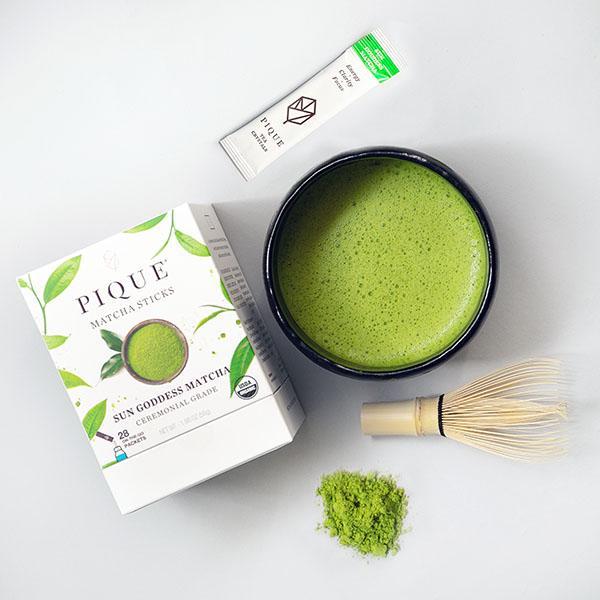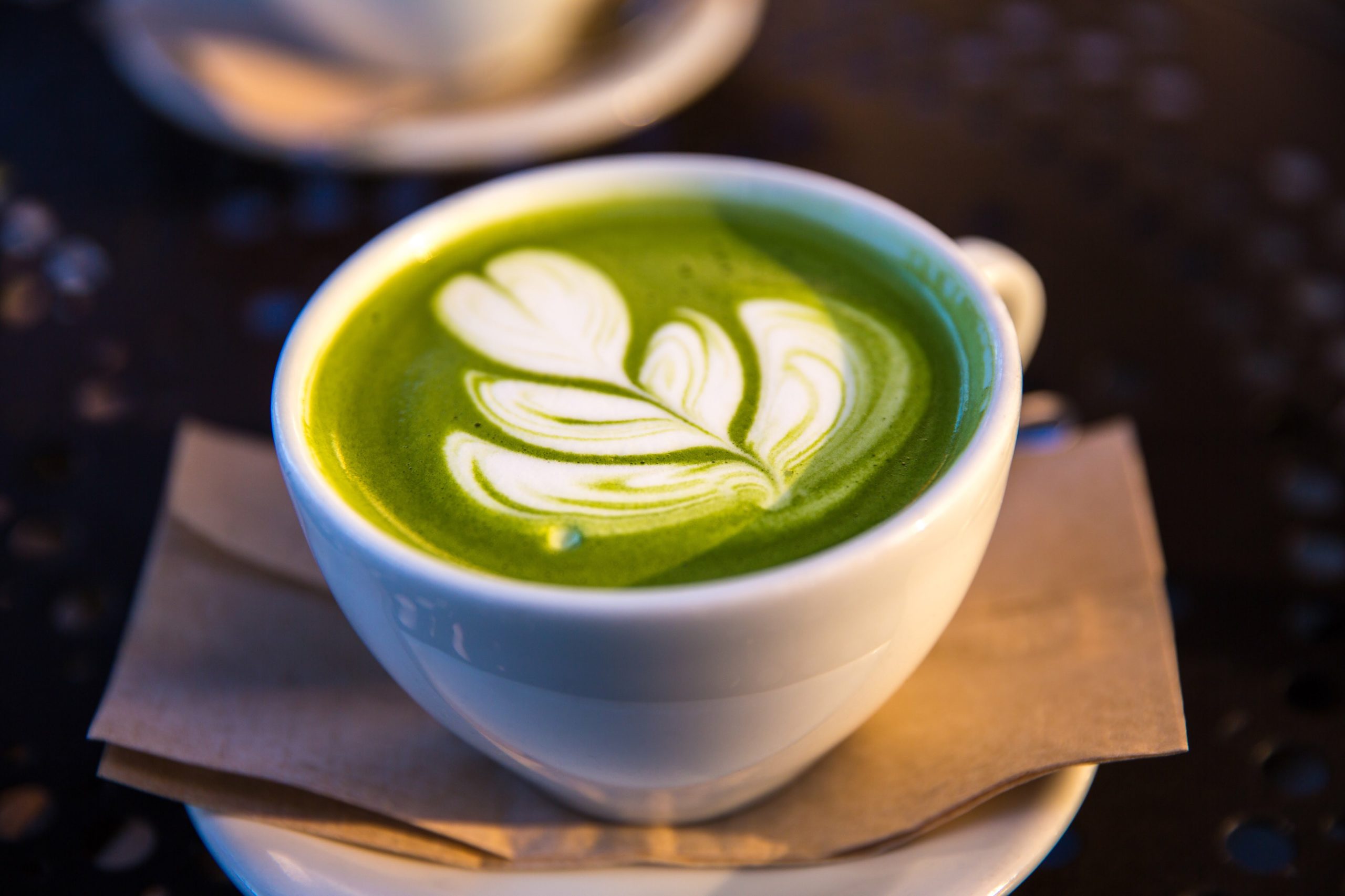Thank you to Pique Tea for sponsoring this post on the health benefits of matcha!
Matcha green tea was the secret weapon of Samurai warriors, who drank it before going into battle. Japanese monks drank matcha in Zen Buddhist ceremonies before entering intensive periods of stillness and meditation.
And, for the average person trying to keep up with the modern day busy lifestyle, drinking a cup or two of this bright green brew could help you tackle your day feeling clear, motivated and energized, rather than foggy, stressed out, and succumbing to chaos!
According to research, the health benefits of matcha are plenty for the mind and body. Before we dig into the research, it helps to understand why matcha green tea is different from traditional green, white, or black teas.
What Makes Matcha Different From Other Teas?
The word matcha literally means “powdered tea”.
While the powdered appearance of matcha is the most obvious difference when compared to other teas, the processing and harvesting are what really set matcha apart and are responsible for it’s unique and potent health benefits.
How Matcha is Grown and Why This Matters
Matcha tea leaves are thrown a lot of shade (literally). They’re grown in the dark.
The shade growing process increases matcha’s nutrients, especially chlorophyll, a green plant pigment that allows plants to absorb energy from sunlight. Chlorophyll is rich in antioxidants and gives matcha an electrifying green color. (1)(2)
Shade growing also increases the amount of L-theanine, which is the amino acid known for promoting mental clarity, focus, and a sense of calm. It’s called nature’s “Xanax” for a reason. (3)
The high amino acid content is also what gives matcha its signature umami taste. If you’re not familiar with the term, umami is the “fifth” taste that describes the savory flavor of foods like miso, parmesan cheese, chicken broth, spinach, and soy sauce.
Matcha Shouldn’t Taste Like Dirt!
You know you’ve got premium matcha when you taste balanced umami flavors, hints of creaminess, and the slightest taste of fresh cut grass. You shouldn’t need to add any sweetener to enjoy sipping it (but it’s okay if you do!)
When choosing a high-quality matcha powder, it’s important to remember: a strong umami flavor = higher in amino acids = the more L-theanine you’ll receive.
Once matcha leaves are harvested, they get steamed, dried, and ground up into a fine powder that you can mix with hot or cold water.
The key difference here is that you’re actually consuming the nutrients from the entire leaf— which is most concentrated in antioxidants, amino acids, and umami flavor. This is unlike traditionally brewed tea, where you’re only drinking the dissolvable portions of the leaf that have been steeped in water.
Now, let’s look closer at the benefits your mind and body receive with every sip.
![]()
5 Health Benefits of Matcha (Backed by Science)
1. Promotes Relaxation, Mood, and Mental Focus
Sipping on matcha may feel as good as taking a nice, long, deep breath— or better.
L-theanine is a rare amino acid that’s only found in tea, with matcha being the richest source. Studies show that L-theanine increases brain levels of serotonin and dopamine, which are two feel-good neurotransmitters that prevent depression and anxiety, and increase feelings of pleasure and motivation in the brain. (4)
Also, take note for your next creative project or exam: Another study noted the synergistic combination of L-theanine and caffeine in matcha, which increased focus and concentration during long tasks and multitasking.
The same study noted L-theanine induced relaxation and actually reduced the overstimulating effects of caffeine (read: no jitters). (5) The Zen monks and Samurai knew what they were doing.
2. Supports Healthy Cognitive Function
Matcha has been called a brainy beverage for a good reason.
EGCG, a group of antioxidants called catechins found in green tea and matcha green tea, have been shown to support healthy brain function and may help prevent age-related neurodegenerative diseases. One study found EGCG enhances learning and memory by improving spatial memory and object recognition. (6)
While matcha isn’t necessarily higher in EGCG than regular green tea, it does contain approximately three times more antioxidants than high-quality green tea, due to its high chlorophyll content.
3. Supports Detoxification
Our bodies are no strangers to toxins and chemicals. They’re in the air we breathe, the products we use, and the food we eat (even organic produce has a legal “pesticide allowance”). One of the best ways to help counteract the damage toxins do to your body is to eat plenty of antioxidant-rich foods. Matcha is one of them.
Would you like to save this post?
Your email address is 100% safe and will never be sent spam.
Studies have found that the chlorophyll found in matcha and other green plants can support the liver’s detoxification processes, eliminate heavy metals and toxins, and may even play a role in cancer prevention. (7)
4. Fights Physical Signs of Aging
By preventing cellular damage, the antioxidants in matcha promote healthy, youthful looking skin and fight physical signs of aging. (8)
As you’ll remember from above, shade grown matcha leaves have increased chlorophyll levels, which is why matcha is richer in chlorophyll than any other green tea.
5. Promotes a Healthy Heart
The anti-inflammatory action of the catechins in green tea have been shown to have protective effects on the cardiovascular system and healthy vascular function. (9)
![]()
How to Choose a High-Quality Matcha
There are a few points to know when it comes to choosing a high quality matcha, and you can grade your matcha with this scorecard.
Here are the main things to look out for:
Grade
There are two grades of matcha: ceremonial grade and culinary grade. Ceremonial grade is the highest quality you can get.
It’s important to note that while ceremonial grade matcha is the highest quality there is, it’s not always guaranteed to be high quality.
This is because there are no set, regulated standards for what’s required of ceremonial grade matcha before it goes on the shelves.
In most cases, organic matcha isn’t ceremonial grade. On the contrary, most ceremonial grade matcha isn’t organic or screened for toxins— which are the last thing you want to be ingesting while drinking a health-promoting beverage. It’s quite the dilemma!
So, when choosing a ceremonial-grade matcha, you’ll want to pick a variety that’s both organic and triple or quadruple screened for toxins.
Flavor
The flavor should have a mildly vegetal, umami taste, with hints of creaminess, roasted notes. It should not taste overly grassy, or have added sweeteners. (Again, it shouldn’t taste like dirt!)
Color
The color of matcha should be bright green, which showcases its high chlorophyll content. If it has a yellow tint, it’s likely not from the first harvest, which can mean it’s lower quality and lower in nutrients.
Froth
When you whisk your matcha, it should always produce a smooth froth with nearly microscopic bubbles. Larger bubbles suggest lower quality.
My Favorite Matcha

Image Credit: Pique Tea
As you can see, there are no downfalls to drinking high-quality matcha. It’s the perfect replacement for anyone who drinks coffee, with the award-winning combination of energizing caffeine and calming l-theanine.
The antioxidants in matcha also make it an incredible health tonic for beautiful skin, better gut health, a healthy heart, and a sharper memory.
While matcha tastes great on its own, you can add matcha to a frothy vanilla almond milk latte for the ultimate healthy treat. I love adding a small spoonful of raw honey for a nice sweetness to compliment the earthy flavor of the matcha.
Speaking of matcha, my favorite matcha I love drinking is Pique’s Sun Goddess Matcha.
Their matcha is the first matcha to be Quadruple Toxin Screened for pesticides, heavy metals, toxic mold AND radioactive isotopes. You can taste its calming effects and quality through its uniquely delicious umami taste!
==>> For a limited time only, you can get a special discount on Pique’s amazing Sun Goddess Matcha! <<==
Do you drink matcha? Why or why not? Share your thoughts in the comments below!
This post may contain affiliate links. If you click on a link and make a purchase, I may receive a small commission.

+ show Comments
- Hide Comments
add a comment